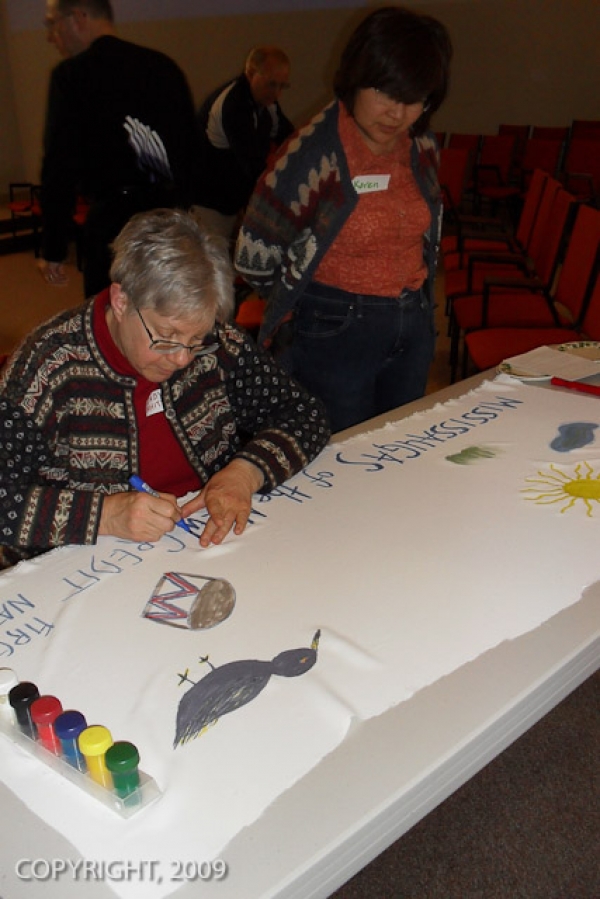The Day of Action will begin on Victoria Island in the Ottawa River, a traditional meeting place for First Nations people. After several speakers and a blessing, the participants will march to Parliament Hill where they will be welcomed by Inuit drummers and dancers. They will then meet Métis representatives at the Canadian Tribute to Human Rights monument, the last stop before the march concludes at Knox Presbyterian Church.
The participants will march carrying banners made in communities and churches across the country, where the bulk of the campaign truly took place. From long before the Day of Action, KAIROS has been inviting concerned Canadians to create banners for the march.
“(The banners) will represent people who can’t be physically present in Ottawa,” said Graham.
Banners can also be tools for creating relationships between indigenous and non-indigenous people, she said. Because KAIROS has asked those making banners to include the traditional indigenous name of the territory they live in, the banner makers have had to reach out and speak to local indigenous people. This interaction is exactly what KAIROS is trying to promote, said Graham.
“It sounds so basic but it happens so rarely in this society,” she said.
Ed Bianchi, KAIROS’ indigenous rights program co-ordinator, said this relationship building has been the most inspiring part of the Roll so far.
“The goal of the whole campaign is to bring indigenous and non-indigenous people together,” he said.
Those people will be coming from all parts of the country. On June 14, a train will depart from Vancouver carrying marchers and their banners to Ottawa. Along the way, it will stop in more than 60 cities and towns to collect participants and banners. Similar trains will be departing from six other cities, including Halifax, Toronto and Niagara Falls, Ont. Once the trains arrive in Ottawa on June 19, all the banners will be joined together into one long, continuous banner that will be carried during the march.
Bianchi hopes this process will create awareness of indigenous rights issues and motivate people to become educated.
“People don’t know the history of Canada and they don’t have the kind of information they need to understand why so many indigenous people in Canada face the challenges they do,” said Bianchi, saying it is a reason why indigenous people are commonly stereotyped in a negative light.
Those challenges still linger among indigenous communities today. Eight per cent of indigenous people aged 25 to 64 have university degrees compared to a Canadian average of 23 per cent, and indigenous unemployment almost triples the national rate.
“What the declaration does is it provides a blueprint for governments and organizations — a roadmap about how to respect and go about protecting indigenous peoples’ rights,” said Bianchi, adding that it is unfair treatment, not the indigenous people themselves, that is to blame for many of these statistics.
Without action, however, Bianchi said many indigenous people think the endorsement of the declaration, along with the government’s apology for residential schools in 2008, is meaningless.
“Roll with the Declaration is a campaign that simply calls on the federal government to do what it promised when it signed the UNDRIP,” said Jenny Prosser of Citizens for Public Justice (CPJ), a national faith-based organization concerned with justice in public policy.
CPJ has endorsed the Roll, and will send a group and banner to the Day of Action, as it did 10 years ago for the KAIROS Blanket Train, a similar campaign that used blankets rather than banners. Both CPJ and KAIROS are rooted in the Christian faith, which is part of the reason they are invested in indigenous rights, said Graham.
“Churches have a unique ability to build bridges between indigenous and non-indigenous people,” she said. “And churches need to take that responsibility very seriously.”
{iarelatednews articleid="5252,5163,4342,3196,2064"}
KAIROS Day of Action in support of indigenous rights
By Luc Rinaldi, Catholic Register SpecialOn June 20, KAIROS will be reminding the Canadian government of its pledge to support indigenous rights in Canada.
The ecumenical group of 11 Christian churches and organizations has planned a Day of Action on Parliament Hill that day, part of its Roll with the Declaration campaign, to make sure the government doesn’t forget it endorsed the United Nations Declaration on the Rights of Indigenous Peoples (UNDRIP) in November 2010.
Roll with the Declaration is a campaign run by KAIROS which will bring Canadians from coast to coast to Ottawa to support indigenous rights.
“Endorsement is but one small step — a necessary step, of course — for the Canadian government,” said Julie Graham, the KAIROS education and campaign program co-ordinator. “We don’t want it to be something written down on paper and forgotten about.”
Please support The Catholic Register
Unlike many media companies, The Catholic Register has never charged readers for access to the news and information on our website. We want to keep our award-winning journalism as widely available as possible. But we need your help.
For more than 125 years, The Register has been a trusted source of faith-based journalism. By making even a small donation you help ensure our future as an important voice in the Catholic Church. If you support the mission of Catholic journalism, please donate today. Thank you.
DONATE

